An appropriation bill, also known as supply bill or spending bill, is a proposed law that authorizes the expenditure of government funds. It is a bill that sets money aside for specific spending. In some democracies, approval of the legislature is necessary for the government to spend money.

Ngāti Whātua is a Māori iwi (tribe) of the lower Northland Peninsula of New Zealand's North Island. It comprises a confederation of four hapū (subtribes) interconnected both by ancestry and by association over time: Te Uri-o-Hau, Te Roroa, Te Taoū, and Ngāti Whātua-o-Ōrākei. The four hapū can act together or separately as independent tribes.
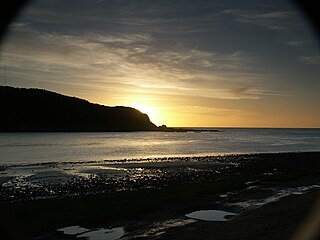
Ngāti Toa, Ngāti Toarangatira or Ngāti Toa Rangatira, is a Māori iwi (tribe) based in the southern North Island and in the northern South Island of New Zealand. Its rohe extends from Whanganui in the north to Palmerston North in the east. Ngāti Toa remains a small iwi with a population of only about 9,000. The iwi is centred around Porirua, Plimmerton, Kāpiti, Blenheim and Arapaoa Island. It has four marae: Takapūwāhia and Hongoeka in Porirua City, and Whakatū and Wairau in the north of the South Island. Ngāti Toa's governing body has the name Te Rūnanga o Toa Rangatira.

Ngāi Te Rangi or Ngāiterangi is a Māori iwi, based in Tauranga, New Zealand. Its rohe extends to Mayor Island / Tuhua and Bowentown in the north, to the Kaimai Range in the west, south of Te Puke and to Maketu in the east.
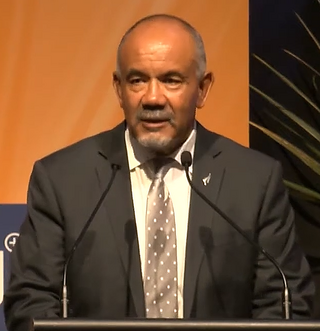
Te Ururoa James William Ben Flavell, also known as Hemi Flavell, is a New Zealand politician who was a co-leader of the Māori Party from 2013 until 2018 and represented the Waiariki electorate for the party in Parliament from 2005 to 2017.
Claims and settlements under the Treaty of Waitangi have been a significant feature of New Zealand politics since the Treaty of Waitangi Act 1975 and the Waitangi Tribunal that was established by that act to hear claims. Successive governments have increasingly provided formal legal and political opportunity for Māori to seek redress for what are seen as breaches by the Crown of guarantees set out in the Treaty of Waitangi. While it has resulted in putting to rest a number of significant longstanding grievances, the process has been subject to criticisms including those who believe that the redress is insufficient to compensate for Māori losses. The settlements are typically seen as part of a broader Māori Renaissance.

Ngāti Awa is a Māori iwi (tribe) centred in the eastern Bay of Plenty Region of New Zealand. It is made of 22 hapū (subtribes), with 15,258 people claiming affiliation to the iwi in 2006. The Ngāti Awa people are primarily located in towns on the Rangitaiki Plain, including Whakatāne, Kawerau, Edgecumbe, Te Teko and Matatā. Two urban hapū also exist in Auckland and Wellington.
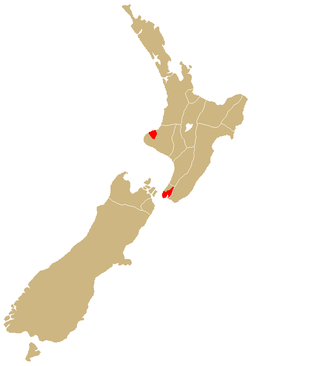
Te Āti Awa is a Māori iwi with traditional bases in the Taranaki and Wellington regions of New Zealand. Approximately 17,000 people registered their affiliation to Te Āti Awa in 2001, with around 10,000 in Taranaki, 2,000 in Wellington and around 5,000 of unspecified regional location.
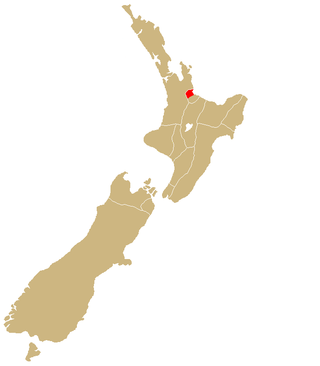
Ngāti Ranginui is a Māori iwi (tribe) in Bay of Plenty, New Zealand. Its rohe extends from Waihi in the north, to the Kaimai Range in the west, to south of Te Puke in the south, and to Tauranga in the east. The rohe does not extend offshore to Matakana Island or Mayor Island / Tuhua.

Ngāti Pūkenga is a Māori iwi centred in Tauranga in the Bay of Plenty region of New Zealand. Its rohe extends to Mayor Island / Tuhua and Waihi in the north, to the Kaimai Range in the west, south of Te Puke and to Maketu in the east, and it has tribal holdings in Whangārei, Hauraki and Maketu.
Ngāi Tāmanuhiri is a Māori iwi of New Zealand and were formerly known by the name of Ngai Tahu, and Ngai Tahu-po respectively. They are descendants of Tahu-nui who is also the eponymous ancestor of the Kāi Tahu iwi of Te Waipounamu.

Ngāti Kurī is a Māori iwi from Northland, New Zealand. The iwi is one of the five Muriwhenua iwi of the far north of the North Island. Ngāti Kurī trace their whakapapa (ancestry) back to Pōhurihanga, the captain of the waka (canoe) Kurahaupō. Kurī, in Māori, means "dog". The rohe of the iwi is focused on the most northern tip of the North Island and includes the Kermadec Islands, Manawatāwhi / Three Kings Islands, Cape Reinga / Te Rerenga Wairua, Ninety Mile Beach, Parengarenga Harbour, Te Kao and Houhora.
Ngāti Whare is a Māori iwi of New Zealand. It is part of a group of tribes participating in the "treelords" Treaty of Waitangi settlement with the New Zealand government involving Central North Island forestry land and cash.

Rangitāne is a Māori iwi (tribe). Their rohe (territory) is in the Manawatū, Horowhenua, Wairarapa and Marlborough areas of New Zealand.
Rahui Reid Katene is a New Zealand politician. She was elected to the 49th New Zealand Parliament at the 2008 general election representing the Māori Party in the seat of Te Tai Tonga, but lost in the 2011 general election to Labour's Rino Tirikatene.
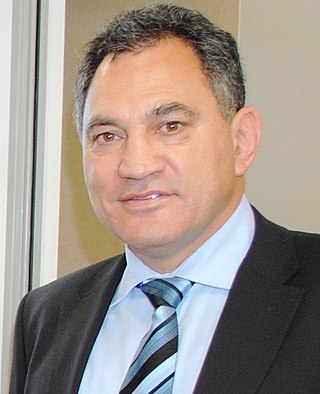
Bernard Paul Quinn is a New Zealand businessman, former rugby union player and former politician. He captained the Wellington Rugby Football Union team from 1981 to 1983 and the New Zealand Māori national team from 1980 to 1982. From 2008 to 2011, he was a Member of the New Zealand House of Representatives for the National Party.
Ngāti Apa ki te Rā Tō is a Māori iwi (tribe) in the upper South Island of New Zealand. Its rohe include the areas around Golden Bay, Tākaka, Tasman Bay / Te Tai-o-Aorere, Motueka, Nelson and Saint Arnaud, including Taitapu and Kawatiri River catchments and Lakes Rotoiti, Rotoroa, and the Tophouse.
Te Atiawa o Te Waka-a-Māui is a Māori iwi (tribe) in the upper South Island of New Zealand. Its rohe extends from Golden Bay and Marlborough Sounds at the top of the South Island to Cape Campbell, St Arnaud and Westport.

Ngāti Whātua o Kaipara is a Māori iwi (tribe) and hapū (sub-tribe) of New Zealand, which is part of the larger Ngāti Whātua iwi. The iwi's rohe is focused around the southern Kaipara Harbour in the Auckland Region of New Zealand. Ngāti Whātua have been present in the Kaipara Harbour since the arrival of the Māhuhu-ki-te-rangi migratory waka, gradually moving towards the north. By the 17th century, Ngāti Whātua reestablished a presence in the southern Kaipara Harbour.












